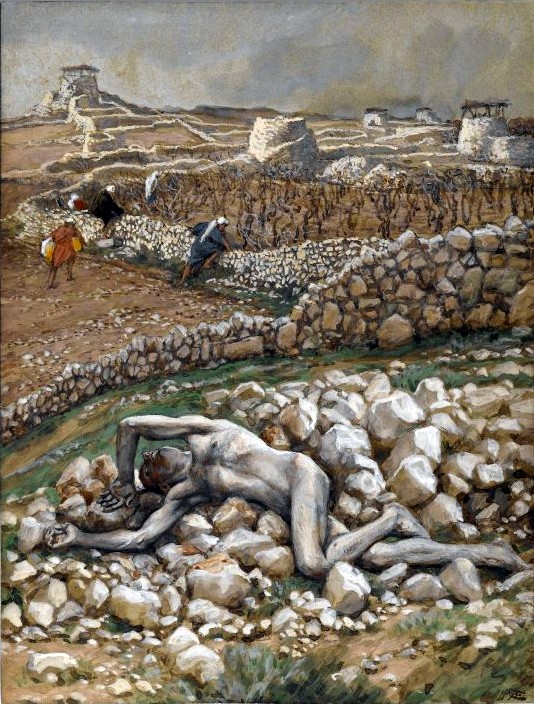27th Sunday of the Year A (02 Oct 2011)
Homily of Fr. Paul Panaretos, S.J.
Tending or Possessing?
My high-school friend’s parents became wine-makers much to their surprise. It was no surprise that Mr. Paluzzi read about home-winemaking; purchased supplies; set to work and successfully served delectable wine. Mrs. Paluzzi was not interested in the workings of making wine, but as far as enjoying a glass with dinner or at night with her husband or while reading a book, she was all for it!
When my parents picked up my friend and me from an outing and returned Daryll to his home, we visited. “Get ready for my Dad,” said Daryll, “he only talks about wine lately.” Mr. Paluzzi didn’t disappoint. His enlightening tour included a delicious selection of his efforts.
I learned dandelion wine was delicious; strawberry wine tasted too sweet; elderberries would be worth growing; and cantaloupe wine was superb. Mr. Paluzzi was thrilled, and Daryll lovingly endured it all yet again. Then: “It’s your turn, Mom.” Mrs. Paluzzi took her cue. “You know why everyone loves the cantaloupe wine?” she asked us with an eye toward her smiling husband. “Angelo didn’t make it. I did.” “You did!” exclaimed my father. “I thought you didn’t want any part of making wine.” “Well, she was that way,” Angelo answered. “When I kept getting all the accolades from our guests, she wanted in on the action. I told her no way. She makes her own wine now. Sometimes her wine outshines mine. More cantaloupe wine, by the way?” he grinned.
I haven’t sipped Paluzzi wine in years nor will I again. My classmate died of cancer not long after graduation. His dad died a little later, and his mom had grown ill before I left the area. Yet, their story is fine vintage: being close to the process of making, what Mrs. Paluzzi had taken for granted, changed her outlook and vitalized her spirit. She gave herself to the discipline of turning fruits into wine.
Mr. and Mrs. Paluzzi said they made their wines to see who made the better: motivation in part. I think that wine as gift to refresh life and companionship began to exert its pull. In her way, Mrs. Paluzzi, like her husband in his, gave herself to the value of that gift. The delight of my friend’s parents caused me to reflect:
many of us are less inclined to be astonished by the process of fruit fermenting into wine than our Jewish ancestors in faith and the first Christians who gave us Jesus’ good news. We may be nonplussed by Isaiah’s song of the vineyard and deaf to its echo in Jesus’ parable of the tenants. Something astonishing rests in Israel’s cherished self-identification as God’s vineyard, namely God’s perception of the enormous value of the house of Israel. So great a value that they saw each other as friends: Let me now sing of my friend, my friend’s song concerning his vineyard—our Creator-Friend’s song about us! God befriends us.
In the stresses and strains, the hopes and joys of life the relationship of God with us remains constant. God’s relationship is constant even when we produce sour grapes. Even then we, the new Israel, like the first people of the promise, are God’s cherished plant.
Jesus’ parable of the tenants is a window on our inconstant and fickle nature with God and humans. By his parable Jesus reminds us God is like the owner, who lovingly prepared his vineyard. God, too, is long-suffering, desiring only respect, hoping the limited and selfish tenants would respect my son.
Just as astonishing as the relationship God desires with us as we are is that the parable’s vineyard remained; the tenants came and went. Are we, tenants, fickle at best or greedy at worst, who come and go? Do we covet ownership? Or do we seek to be people who produce...fruit by tending our corners of the vineyard given us in trust?
In your daily 15 minutes with Jesus this week
- Ask the Trinity to allow you to see with their vision.
- Ask Mary and your patron saint to present you to Jesus
- Speak to Jesus about the ways you exercise stewardship with people and things God has entrusted to you.
- Desire to be more attentive but not possessive; to be more confident in God’s providence and aware of freedom, yours and that of others.
- Close by saying slowing the Lord’s Prayer, which is our act of entrusting ourselves to God: in praise, in need and in our desire to grow more like Jesus, God’s son. Through Jesus’ prayer we remind ourselves that as part of creation, God cherishes us very fondly, and we ask to return it to God by how we treat all other creatures.
____________________________________________________________________________
Wiki-image by Tissot of the son killed and hurled from the vineyard is in the public domain.

No comments:
Post a Comment